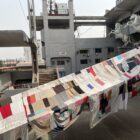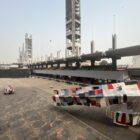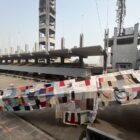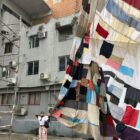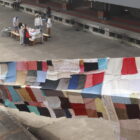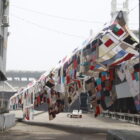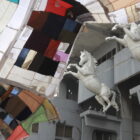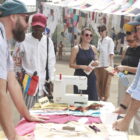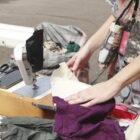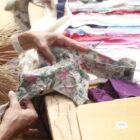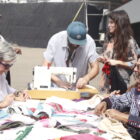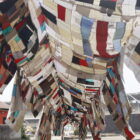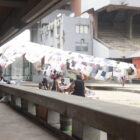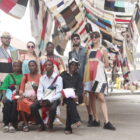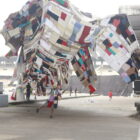re-(t)exHile
re-(t)exHile is a research device that acts and reflects on the idea of the body as an inhabited territory, a physical and symbolic space where struggles, resistance, and social, political, and economic inheritances are reflected. This place of dispute is also a refuge, a minimum space for transformation and care.
Our project moves forward to investigate concepts such as identity and border through the medium of a flag with the inscription of the word outsider. Outsider is a work that has traveled through different geographies. Dislocating its function, the piece – the flag – is never located in a fixed place. It moves physically and alters its function, ranging from a refuge, blanket, wrap, and sometimes acting as a roof. Far from marking a stable space, the flag’s movement indicates the randomness of its limits.
On the occasion of the 4th edition of Lagos biennale, with the theme Refuge, we take this concept further by investigating the problem of textile waste that travels from the Global North to the Global South disguised as second-hand clothing. As a result of the "Fast fashion" phenomenon, consumption and overproduction of textiles, countries from the Global North send tons of second-hand clothes to African countries. Many of these cheap clothes end up once their short lives are over: on huge dump sites, burnt on open fires, along riverbeds and washed out into the sea, with severe consequences for people and the planet. By creating an installation in the air space, we make a minimal refuge exploring textile architecture through a piece produced with almost 500 second-hand textile material bought at the Katangwa market in Lagos.
Through a collective sewing action carried out by our team together with local collaborators, the piece was shaped throughout the duration of the biennial. The processual nature of the project was gradually modifying the shape of the refuge as we sew together and add parts to the flag.
The project aims to make visible the exploitative patterns shaped by the colonial legacy embedded in the secondhand trade and to advocate for sustainable fashion practices.
Project by: Maria Alejandra Gatti, Martinka Bobrikova, Oscar de Carmen, Anto Lloveras.
In lagos the project was joined by Adebola Badmus, the Creative Director of DSA LAGOS, and her team: Andrew Tokpo, Michael Laly, Tomiwa Oseni, Ayomide Adewale, Lateefa Abdul-Azeez, Abike Ibrahim, Rachael Akeju.
Special thanks goes to Ebunoluwa Orebanjo and Timilehin Oludare Osanyintolu.
The project is supported using public funding by
Acción Cultural Española AC/E,
OCA- Office Contemporary Art Norway,
Slovak Arts Council, Norwegian Crafts
